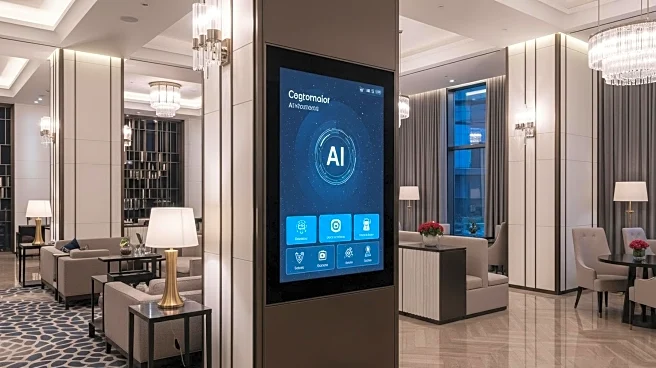What's Happening?
The hospitality industry is grappling with the complexities of integrating artificial intelligence (AI) due to poor data architecture and quality maintenance. As AI becomes increasingly vital for personalized service and strategic insights, the industry must overcome the 'garbage in, garbage out' (GIGO) problem, where inaccurate data leads to ineffective AI outcomes. The process requires robust data connections, including integrations, interfaces, and APIs, to ensure clean and structured datasets. The industry's legacy of inadequate data management has left many businesses struggling to keep up with technological advancements. Experts emphasize the importance of establishing a 'single source of truth' through data standardization and consolidation, which is crucial for AI to function beyond simple automation.
Why It's Important?
The integration of AI in hospitality is crucial for enhancing guest experiences through personalized services and operational efficiency. However, the industry's historical challenges with data management pose significant barriers. Clean and structured data is essential for AI to deliver on its promise of predictive personalization, dynamic pricing, and operational automation. Without addressing these data issues, businesses risk falling behind in a competitive market where AI-driven insights can significantly impact profitability and guest satisfaction. The industry's ability to adapt and improve data connectivity will determine its success in leveraging AI for transformative outcomes.
What's Next?
The hospitality industry must prioritize the development of robust data infrastructures to support AI integration. This involves creating two-way APIs among key systems like PMS, CRS, and CRM to facilitate real-time data flow. As AI technology evolves, businesses need to focus on flexible and open interfaces that allow for incremental improvements. Stakeholders must align on data quality and connectivity to avoid the pitfalls of GIGO and ensure AI can effectively enhance guest experiences. The future of hospitality will depend on operators investing in clean data foundations and embracing continuous improvement to harness AI's full potential.
Beyond the Headlines
The ethical and strategic implications of AI in hospitality extend beyond technical challenges. The risk of 'garbage in, hallucination out' (GIHO) highlights the potential for AI to produce misleading results if fed incorrect data. This underscores the importance of human oversight and governance in AI applications. Additionally, the industry's reliance on siloed systems and resistance to collaboration among suppliers can hinder progress. Embracing a culture of transparency and cooperation is essential for realizing AI's transformative potential while safeguarding against strategic risks.









